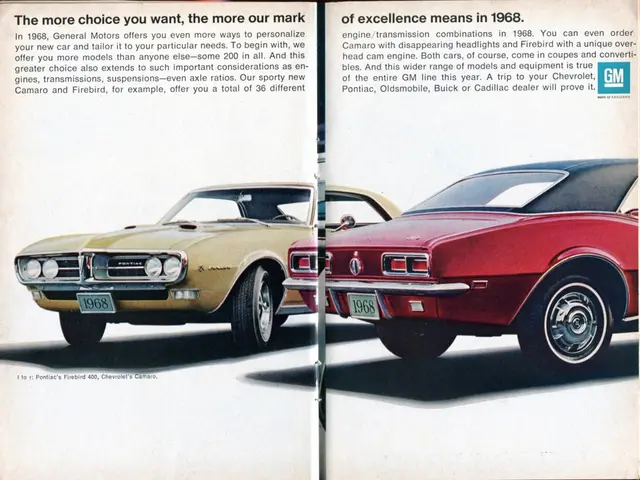Broadcasters Advocate for Elimination of Outdated Regulations at FCC
Making Waves in Broadcasting: Broadcasters Urge FCC to Loosen the Reins
The Federal Communications Commission (FCC) has unleashed a flurry of comments and suggestions in response to its call to axe outdated regulations. In the spotlight, broadcasters are pushing hard for the scrapping of ownership caps and a multitude of other regulations.
With Docket 25-133 making waves on the FCC's website, raking in an impressive 910 filings as of April 17, the NAB, Nexstar, Gray Media, Sinclair, and a host of other broadcasters have weighed in.
NAB's Pitch: Modernization is Key
"If there was ever a proceeding tailor-made for broadcasters, this is it," the NAB's submission reads. The NAB argues that updating or even deleting these outdated rules that affect only broadcast stations would bring rationality to the FCC's regulatory regime, making television and radio broadcasting stronger and more competitive.
To achieve success, the NAB advocates that the FCC's first step should be to eliminate the national TV ownership rule and local TV rules.
In addition, the NAB proposes phasing out rules that hamper the transition to NextGen TV, sunsetting ATSC 1.0 broadcasts, updating Emergency Alert System (EAS) rules, and reducing paperwork in areas like children's programming, Equal Employment Opportunity (EEO), and others.
Nexstar's Case: The Burden of Heritage
In their filing, Nexstar, the nation's largest broadcast station group, has garnered a slew of letters emphasizing the need for the elimination of ownership caps and local market rules. One such plea comes from Jerry Brehm, vice president and general manager of WTEN-TV & WXXA-TV in Albany, New York. He contends that these rules are a relic of days gone by, hindering local broadcasters' ability to vie for prominence against tech behemoths who lack any genuine connection to the community.
Gray Media's Manifesto: A Leaner, More Competitive Landscape
In their submission, Gray Media echoes similar sentiments, urging the FCC to junk ownership caps and regulations. They also propose reforms and repeals of children's programming mandates, sales identification, and requirements related to local issues, EAS, Equal Employment Opportunity Rules (EEO), Biennial Ownership Reporting, and Public File Requirements.
Sinclair's Call to Action: Level the Playing Field
Sinclair, in their wide-ranging filing, commends the FCC's deregulatory push and calls for addressing "the toxic combination of a rapidly changing competitive environment" and the now antiquated regulatory burdens impacting broadcasters and consumers. Arguing that elimination of the local and national ownership caps and setting a sunset date for ATSC 1.0 is essential, they also propose measures to reduce regulatory burdens, hasten the transition to ATSC 3.0, and support their fellow broadcasters.
Mission Broadcasting's Appeal: Climbing Back from Regulatory Scrutiny
For Mission Broadcasting, their filing gathers letters from executives at stations like WPIX in New York City, battling regulatory scrutiny from the FCC over claims of violating ownership rules. These outdated regulations, the broadcasters believe, are impeding the ability of local stations to compete in the increasingly digital and competitive media industry.
A Simplified Future for Broadcasters?
Various state broadcasters associations, America's Public Television Stations (APTS), PBS, and the Society of Broadcast Engineers are amongst others who have chime in, advocating for elimination of unnecessary paperwork obligations, chief operator positions, and updating of the outdated station identification rule. They are rallying behind the FCC, inviting them to embark on a path of deregulation that will pave the way for modernization and relief for the burdensome rules that weigh on broadcasters.
- The FCC's Docket 25-133 has stirred discussions within the broadcasting industry, with numerous broadcasters urging the commission to revise outdated regulations.
- NAB argues that modernizing the FCC's regulatory regime can strengthen and make television and radio broadcasting more competitive.
- In their submission, NAB suggests eliminating national TV ownership rules and local TV regulations, as well as rules that hinder the transition to NextGen TV.
- Nexstar, the largest broadcast station group, presses for the elimination of ownership caps and local market rules, claiming these hinder local broadcasters' competitiveness.
- Gray Media has urged the FCC to abolish ownership caps and regulations, and also proposes reforms in children's programming mandates and EEO rules.
- Sinclair commends the FCC's deregulatory push and calls for addressing the impact of legacy regulations on broadcasters and consumers.
- Mission Broadcasting believes outdated regulations are impeding local stations' ability to compete in the digital and competitive media industry.
- The Society of Broadcast Engineers advocates for reducing paperwork obligations and updating the station identification rule for broadcasters.
- Various state broadcasters associations and PBS are rallying behind the FCC, advocating for a path of deregulation that can lead to modernization and relief for the burdensome rules.
- The FCC's loosening of regulations could potentially foster a more competitive landscape for broadcasters, both in terms of financial investments and educational content offerings.
- The deregulation could also impact the general news, crime-and-justice, sports, and politics spheres, as broadcasters adapt to new opportunities and challenges.
- Additionally, the removal of regulations and the transition to NextGen TV could lead to advancements in audio and video quality, revolutionizing the television industry as a whole.








